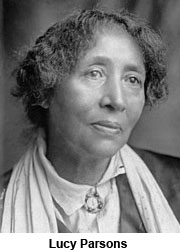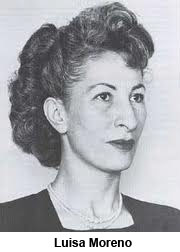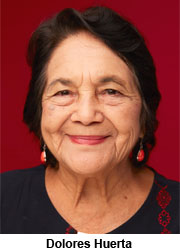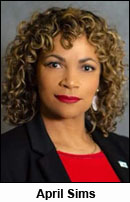OPINION
Union Sisters pointed the way to gender equity
Labor women of color have long organized for fair treatment for all workers
By APRIL SIMS
(March 27, 2019) — In March, we have been honoring the history of women in the United States, seeking to highlight the accomplishments and contributions of those who have been overlooked by our dominant historical narrative.
In the labor movement, women have been working, organizing, and leading for generations; women of color have been doing so well before our collective retelling of history acknowledges women’s entry to the formal work force during World War II. Working women of color have been, and continue to be, some of the most formidable labor organizers and leaders of the last 150 years.
 Lucy Parsons participated in the founding of the Industrial Workers of the World in 1905, and spent the 1920s working with the International Labor Defense defending labor activists and unjustly-accused black Americans who were targeted for their organizing activities, their race, or both.
Lucy Parsons participated in the founding of the Industrial Workers of the World in 1905, and spent the 1920s working with the International Labor Defense defending labor activists and unjustly-accused black Americans who were targeted for their organizing activities, their race, or both.
 Luisa Moreno started by organizing her seamstress co-workers, before becoming an AFL organizer in 1935. She organized workers across the South and Southwest, encouraged women’s leadership in labor, and co-founded El Congreso de Pueblos de Hablan Española, an influential coalition of labor and civil rights activists in the 1930s and ’40s that insisted on unity amongst Latinx workers, regardless of immigration status.
Luisa Moreno started by organizing her seamstress co-workers, before becoming an AFL organizer in 1935. She organized workers across the South and Southwest, encouraged women’s leadership in labor, and co-founded El Congreso de Pueblos de Hablan Española, an influential coalition of labor and civil rights activists in the 1930s and ’40s that insisted on unity amongst Latinx workers, regardless of immigration status.
 Dolores Huerta co-founded the National Farm Workers Association, which later merged into the United Farm Workers Organizing Committee; she was instrumental in some of the nation’s first collective bargaining agreements between farm workers and employers in the ‘50s and ‘60s. She espoused the unique ability of Latina women to harness the power of community in their organizing efforts, recognizing that for women, community organizing, labor organizing, and political organizing are fundamentally intertwined.
Dolores Huerta co-founded the National Farm Workers Association, which later merged into the United Farm Workers Organizing Committee; she was instrumental in some of the nation’s first collective bargaining agreements between farm workers and employers in the ‘50s and ‘60s. She espoused the unique ability of Latina women to harness the power of community in their organizing efforts, recognizing that for women, community organizing, labor organizing, and political organizing are fundamentally intertwined.
Today, we continue the fight for gender equity and fair treatment in the workplace, advocating for equal pay for equal work. Just as our dominant historical narrative is inadequate, so too is our dominant understanding of inequity in women’s pay. Our work towards narrowing the gender pay gap is hampered by a systemic devaluation of the work that women perform.
In pay alone, our society undervalues professions that we socially code as feminine: teachers, nurses, child care workers, domestic workers, home healthcare providers, and many more. These professions are not only fundamental for ensuring a healthy and functioning society, they also require a complex set of skills, creative problem solving, and high emotional intelligence. These are skills we should award with better pay and more respect.
 But combating gender inequity in employment is not solely about pay. We must also address the societal pressures that can limit and control women’s choices. When professions limit access to childcare, base promotions on hours worked rather than quality of work performed, require long commutes at irregular hours, etc., many women are effectively excluded from employment, whether intentionally or not. While child and family care is less gendered now than in the past, women still do the majority of this work; if education and job training continues to be designed for people who do not have these responsibilities, women will remain effectively barred from these professions. Ensuring that pay is the same, regardless of gender, is one thing; but what use is it, if women can’t even get in the door for jobs?
But combating gender inequity in employment is not solely about pay. We must also address the societal pressures that can limit and control women’s choices. When professions limit access to childcare, base promotions on hours worked rather than quality of work performed, require long commutes at irregular hours, etc., many women are effectively excluded from employment, whether intentionally or not. While child and family care is less gendered now than in the past, women still do the majority of this work; if education and job training continues to be designed for people who do not have these responsibilities, women will remain effectively barred from these professions. Ensuring that pay is the same, regardless of gender, is one thing; but what use is it, if women can’t even get in the door for jobs?
We have to take a holistic approach to pay equity, and recognize that such an approach requires us to center the intersections of womanhood, to look at how race, class, sexuality, and disability impact the lives of women who hold these identities. Fortunately, we have the guidance of our sisters in labor who have come before us, embraced the complexities of worker’s lives, and won hard-earned victories for this nation’s workers.
ALL ARE INVITED to join the WSLC for a screening and discussion of At the River I Stand starting at 6 p.m. on Thursday, April 4. Come early at 5 p.m. for some refreshments and fellowship. RSVP here. The next day — Friday, April 5 — join the WSLC for an all-day Race and Labor Training from 9 a.m. to 5 p.m. RSVP here. This training is a deep-dive conversation about racial justice and equity, examining the history of the labor movement and collectively tackling racism in organized labor. Get details.
 April Sims is Secretary Treasurer of the Washington State Labor Council, AFL-CIO, representing the interests of more than 600 union organizations with approximately 550,000 rank-and-file members.
April Sims is Secretary Treasurer of the Washington State Labor Council, AFL-CIO, representing the interests of more than 600 union organizations with approximately 550,000 rank-and-file members.





